Text originally published Dec 23, 2023
Bearing Witness - Mr. Fish
Writing and photographing in wartime are acts of resistance, acts of faith. They affirm the belief that one day - a day the writers, journalists and photographers may never see - the words and images will evoke empathy, understanding, outrage and provide wisdom. They chronicle not only the facts, although facts are important, but the texture, sacredness and grief of lives and communities lost. They tell the world what war is like, how those caught in its maw of death endure, how there are those who sacrifice for others and those who do not, what fear and hunger are like, what death is like. They transmit the cries of children, the wails of grief of the mothers, the daily struggle in the face of savage industrial violence, the triumph of their humanity through filth, sickness, humiliation and fear. This is why writers, photographers and journalists are targeted by aggressors in war — including the Israelis — for obliteration. They stand as witnesses to evil, an evil the aggressors want buried and forgotten. They expose the lies. They condemn, even from the grave, their killers. Israel has killed at least 13 Palestinian poets and writers along with at least 67 journalists and media workers in Gaza, and three in Lebanon since Oct. 7.
I experienced futility and outrage when I covered war. I wondered if I had done enough, or if it was even worth the risk. But you go on because to do nothing is to be complicit. You report because you care. You will make it hard for the killers to deny their crimes.
This brings me to the Palestinian novelist and playwright Atef Abu Saif. He and his 15-year-old son Yasser, who live in the occupied West Bank, were visiting family in Gaza — where he was born — when Israel began its scorched earth campaign. Atef is no stranger to the violence of the Israeli occupiers. He was two months old during the 1973 war and writes “I’ve been living through wars ever since. Just as life is a pause between two deaths, Palestine, as a place and as an idea, is a timeout in the middle of many wars.”
During Operation Cast Lead, the 2008/2009 Israel assault on Gaza, Atef sheltered in the corridor of his Gaza family home for 22 nights with his wife, Hanna and two children, while Israel bombed and shelled. His book “The Drone Eats with Me: Diaries from a City Under Fire,” is an account of Operation Protective Edge, the 2014 Israeli assault on Gaza that killed 1,523 Palestinian civilians, including 519 children.
“Memories of war can be strangely positive, because to have them at all means you must have survived,” he notes sardonically.
He again did what writers do, including the professor and poet Refaat Alareer, who was killed, along with Refaat’s brother, sister and her four children, in an airstrike on his sister’s apartment building in Gaza on Dec. 7. The Euro-Mediterranean Human Rights Monitor said that Alareer was deliberately targeted, “surgically bombed out of the entire building.” His killing came after weeks of “death threats that Refaat received online and by phone from Israeli accounts.” He had moved to his sister’s because of the threats.
Refaat, whose doctorate was on the metaphysical poet John Donne, wrote a poem in November, called “If I Must Die,” which became his last will and testament. It has been translated into numerous languages. A reading of the poem by the actor Brian Cox has been viewed almost 30 million times.
If I must die,
you must live
to tell my story
to sell my things
to buy a piece of cloth
and some strings,
(make it white with a long tail)
so that a child, somewhere in Gaza
while looking heaven in the eye
awaiting his dad who left in a blaze—
and bid no one farewell
not even to his flesh
not even to himself—
sees the kite, my kite you made,
flying up above
and thinks for a moment an angel is there
bringing back love
If I must die
let it bring hope
let it be a tale.
Atef, once again finding himself living amid the explosions and carnage from Israeli shells and bombs, doggedly publishes his observations and reflections. His accounts are often difficult to transmit because of Israel’s blockage of Internet and phone service. They have appeared in The Washington Post, The New York Times, The Nation and Slate.
On the first day of the Israeli bombardment, a friend, the young poet and musician Omar Abu Shawish, is killed, apparently in an Israeli naval bombardment, though later reports would say he was killed in an airstrike as he was walking to work. Atef wonders about the Israeli soldiers watching him and his family with “their infrared lenses and satellite photography.” Can “they count the loafs of bread in my basket, or the number of falafel balls on my plate?” he wonders. He watches the crowds of dazed and confused families, their homes in rubble, carrying “mattresses, bags of clothes, food and drink.” He stands mutely before “the supermarket, the bureau de change, the falafel shop, the fruit stalls, the perfume parlor, the sweets shop, the toy shop — all burned.”
“Blood was everywhere, along with bits of kids’ toys, cans from the supermarket, smashed fruit, broken bicycles and shattered perfume bottles,” he writes. “The place looked like a charcoal drawing of a town scorched by a dragon.”
“I went to the Press House, where journalists were frantically downloading images and writing reports for their agencies. I was sitting with Bilal, the Press House manager, when an explosion shook the building. Windows shattered, and the ceiling collapsed onto us in chunks. We ran toward the central hall. One of the journalists was bleeding, having been hit by flying glass. After 20 minutes, we ventured out to inspect the damage. I noticed that Ramadan decorations were still hanging in the street.”
“The city has become a wasteland of rubble and debris,” Atef, who has been the Palestinian Authority’s minister of culture since 2019, writes in the early days of the Israeli shelling of Gaza City. “Beautiful buildings fall like columns of smoke. I often think about the time I was shot as a kid, during the first intifada, and how my mother told me I actually died for a few minutes before being brought back to life. Maybe I can do the same this time, I think.”
He leaves his teenage son with family members.
“The Palestinian logic is that in wartime, we should all sleep in different places, so that if part of the family is killed, another part lives,” he writes. “The U.N. schools are getting more crowded with displaced families. The hope is that the U.N. flag will save them, though in previous wars, that hasn’t been the case.”
On Tuesday Oct. 17 he writes:
I see death approaching, hear its steps growing louder. Just be done with it, I think. It’s the 11th day of the conflict, but all the days have merged into one: the same bombardment, the same fear, the same smell. On the news, I read the names of the dead on the ticker at the bottom of the screen. I wait for my name to appear.
In the morning, my phone rang. It was Rulla, a relative in the West Bank, telling me she had heard there’d been an airstrike in Talat Howa, a neighborhood on the south side of Gaza City where my cousin Hatem lives. Hatem is married to Huda, my wife’s only sister. He lives in a four-story building that also houses his mother and brothers and their families.
I called around, but no one’s phone was working. I walked to al-Shifa Hospital to read the names: Lists of the dead are pinned up daily outside a makeshift morgue. I could barely approach the building: Thousands of Gazans had made the hospital their home; its gardens, its hallways, every empty space or spare corner had a family in it. I gave up and headed toward Hatem’s.
Thirty minutes later, I was on his street. Rulla had been right. Huda and Hatem’s building had been hit only an hour earlier. The bodies of their daughter and grandchild had already been retrieved; the only known survivor was Wissam, one of their other daughters, who had been taken to the ICU. Wissam had gone straight into surgery, where both of her legs and her right hand had been amputated. Her graduation ceremony from art college had taken place only the day before. She has to spend the rest of her life without legs, with one hand. “What about the others?” I asked someone.
“We can’t find them,” came the reply.
Amid the rubble, we shouted: “Hello? Can anyone hear us?” We called out the names of those still missing, hoping some might still be alive. By the end of the day, we’d managed to find five bodies, including that of a 3-month-old. We went to the cemetery to bury them.
In the evening, I went to see Wissam in the hospital; she was barely awake. After half an hour, she asked me: “Khalo [Uncle], I’m dreaming, right?”
I said, “We are all in a dream.”
“My dream is terrifying! Why?”
“All our dreams are terrifying.”
After 10 minutes of silence, she said, “Don’t lie to me, Khalo. In my dream, I don’t have legs. It’s true, isn’t it? I have no legs?”
“But you said it’s a dream.”
“I don’t like this dream, Khalo.”
I had to leave. For a long 10 minutes, I cried and cried. Overwhelmed by the horrors of the past few days, I walked out of the hospital and found myself wandering the streets. I thought idly, we could turn this city into a film set for war movies. Second World War films and end-of-the-world movies. We could hire it out to the best Hollywood directors. Doomsday on demand. Who could have the courage to tell Hanna, so far away in Ramallah, that her only sister had been killed? That her family had been killed? I phoned my colleague Manar and asked her to go to our house with a couple of friends and try to delay the news from getting to her. “Lie to her,” I told Manar. “Say the building was attacked by F-16s but the neighbors think Huda and Hatem were out at the time. Any lie that could help.”
Leaflets in Arabic dropped by Israeli helicopters float down from the sky. They announce that anyone who remains north of the Wadi waterway will be considered a partner to terrorism, “meaning,” Atef writes, “the Israelis can shoot on sight.” The electricity is cut. Food, fuel and water begin to run out. The wounded are operated on without anesthesia. There are no painkillers or sedatives. He visits his niece Wissam, racked with pain, in al-Shifa Hospital who asks him for a lethal injection. She says Allah will forgive her.
“But he will not forgive me, Wissam.”
“I am going to ask him to, on your behalf,” she says.
After airstrikes he joins the rescue teams “under the cricket-like hum of drones we couldn’t see in the sky.” A line from T.S Eliot, “a heap of broken images,” runs through his head. The injured and dead are “transported on three-wheeled bicycles or dragged along in carts by animals.”
“We picked up pieces of mutilated bodies and gathered them on a blanket; you find a leg here, a hand there, while the rest looks like minced meat,” he writes. “In the past week, many Gazans have started writing their names on their hands and legs, in pen or permanent marker, so they can be identified when death comes. This might seem macabre, but it makes perfect sense: We want to be remembered; we want our stories to be told; we seek dignity. At the very least, our names will be on our graves. The smell of unretrieved bodies under the ruins of a house hit last week remains in the air. The more time passes, the stronger the smell.”
The scenes around him become surreal. On Nov. 19, day 44 of the assault, he writes:
A man rides a horse toward me with the body of a dead teenager slung over the saddle in front. It seems it’s his son, perhaps. It looks like a scene from a historical movie, only the horse is weak and barely able to move. He is back from no battle. He is no knight. His eyes are full of tears as he holds the little riding crop in one hand and the bridle in the other. I have an impulse to photograph him but then feel suddenly sick at the idea. He salutes no one. He barely looks up. He is too consumed with his own loss. Most people are using the camp’s old cemetery; it’s the safest and although it is technically long-since full, they have started digging shallower graves and burying the new dead on top of the old—keeping families together, of course.
On Nov. 21 after constant tank-shelling, he decides to flee the Jabaliya neighborhood in the north of Gaza for the south, with his son and mother-in-law who is in a wheelchair. They must pass through Israeli checkpoints, where soldiers randomly select men and boys from the line for detention.
“Scores of bodies are strewn along both sides of the road,” he writes. “Rotting, it seems, into the ground. The smell is horrendous. A hand reaches out toward us from the window of a burned-out car, as if asking for something, from me specifically. I see what looks like two headless bodies in a car — limbs and precious body parts just thrown away and left to fester.”
He tells his son Yasser: “Don’t look. Just keep walking, son."
In early Dec. his family home is destroyed in an airstrike.
“The house a writer grows up in is a well from which to draw material. In each of my novels, whenever I wanted to depict a typical house in the camp, I conjured ours. I’d move the furniture around a bit, change the name of the alley, but who was I kidding? It was always our house.”
“All the houses in Jabalya are small. They’re built randomly, haphazardly, and they’re not made to last. These houses replaced the tents that Palestinians like my grandmother Eisha lived in after the displacements of 1948. Those who built them always thought they’d soon be returning to the beautiful, spacious homes they’d left behind in the towns and villages of historic Palestine. That return never happened, despite our many rituals of hope, like safeguarding the key to the old family home. The future keeps betraying us, but the past is ours.”
“Though I’ve lived in many cities around the world, and visited many more, that tiny ramshackle abode was the only place I ever felt at home’” he goes on. “Friends and colleagues always asked: Why don’t you live in Europe or America? You have the opportunity. My students chimed in: Why did you return to Gaza? My answer was always the same: ‘Because in Gaza, in an alleyway in the Saftawi neighborhood of Jabalya, there stands a little house that cannot be found anywhere else in the world.’ If on doomsday God were to ask me where I would like to be sent, I wouldn’t hesitate in saying, ‘Home.’ Now there is no home.”
Atef is now trapped in southern Gaza with his son. His niece was transferred to a hospital in Egypt. Israel continues to pound Gaza with over 20,000 dead and 50,000 wounded. Atef continues to write.
The story of Christmas is the story of a poor woman, nine months pregnant, and her husband forced to leave their home in Nazareth in northern Galilee. The occupying Roman power has demanded they register for the census 90 miles away in Bethlehem. When they arrive there are no rooms. She gives birth in a stable. King Herod - who learned from the Magi of the birth of the messiah - orders his soldiers to hunt down every child two years old and under in Bethlehem and the vicinity and murder them. An angel warns Joseph in a dream to flee. The couple and infant escape under the cover of darkness and make the 40-mile journey to Egypt.
I was in a refugee camp in the early 1980s for Guatemalans who had fled the war into Honduras. The peasant farmers and their families, living in filth and mud, their villages and homes burned or abandoned, were decorating their tents with strips of colored paper to celebrate the Massacre of the Innocents.
“Why is this such an important day?” I asked.
“It was on this day that Christ became a refugee,” a farmer answered.
The Christmas story was not written for the oppressors. It was written for the oppressed. We are called to protect the innocents. We are called to defy the occupying power. Atef, Refaat and those like them, who speak to us at the risk of death, echo this Biblical injunction. They speak so we will not be silent. They speak so we will take these words and images and hold them up to the principalities of the world — the media, politicians, diplomats, universities, the wealthy and privileged, the weapons manufacturers, the Pentagon and the Israel lobby groups — who are orchestrating the genocide in Gaza. The infant Christ is not lying today in straw, but a pile of broken concrete.
Evil has not changed down the millenia. Neither has goodness.


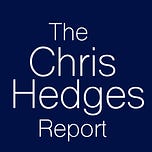










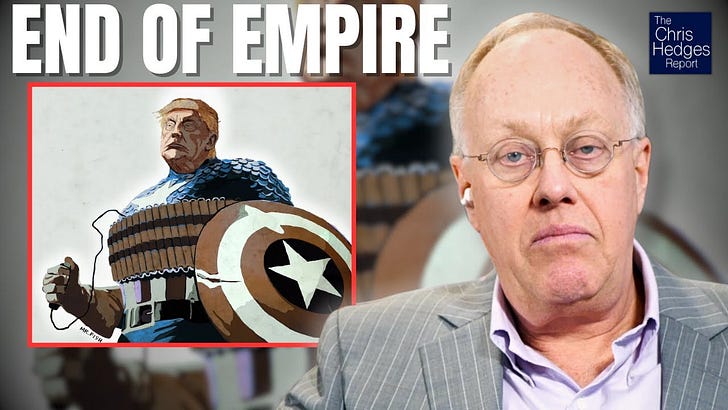
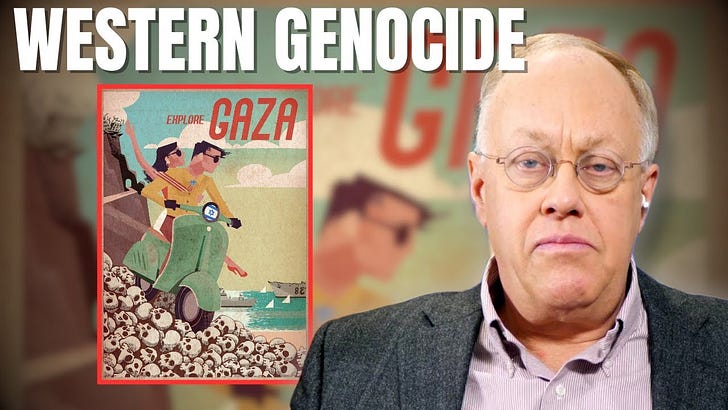
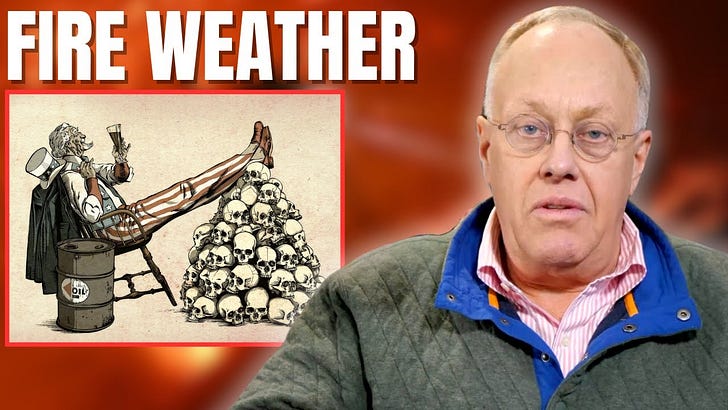
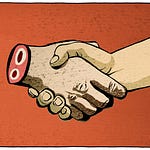


Wow, tough crowd in the comments. Maybe some bot, propagandist agenda, or maybe someone too angry to see suffering everywhere deserves attention.
The author is not perfect - but I don’t read in his books and articles that he claims that status.
I do see empathy. It is abundantly clear Mr. Hedges is humbled by the utterly insane carnage of human folly. Can our government leadership from the past decades claim such ground?
I am not a propagandist!
I've followed this man as closely as ANYBODY this past decade ...
I used to love the guy, but not since the lockdowns ... I'm a true independent progressive just like Hedges once was ... I did not vote for either of those sexually-obsessed bullies in the 2020 PRES election ...
And here's one of Hedges' more revealing comments:
Did you know ...
On DEC 2, 2021 ...
The FDA was compelled by a court ruling to release Phizer's vax trial data that revealed 1,223 post-jab deaths and 34,762 adverse events in the first 10 weeks of its trial ... The FDA attempted to delay the full release of this data for 75 years! ... and with this development, it was proven that the COVID vax was NOT "safe & effective" ...
And then, just 30 days later ...
On JAN 1, 2022 ...
Chris Hedges made this comment on the Krystal Kyle & Friends Podcast (Episode #54):
Go to the 1:08:47 mark:
https://krystalkyleandfriends.substack.com/p/episode-54-audio-chris-hedges#details
"I don't think we're going to stop the pandemic and mutations until everybody gets vaccinated" ... Chris Hedges DID NOT have to take sides on this issue ... He could have said it's a personal decision, but no ...
Most people would never tell another person to "walk the plank" if they knew better, but that's exactly what Hedges did here ... he knew the VAX was rushed to market after only one year (the average is 10 years), he knew about the explosive FDA FOIA release and he had to have seen the many videos of vax-injured people ... but he chose to push the "safe & effective" narrative anyway! ... and then about 2m after making that same comment during the interview above, Hedges openly admitted that he "does not trust Moderna or Phizer" ... clearly, this man did not give a hoot about the consequences ...
And here's where you and I disagree most: I do not believe people like Hedges should be forgiven for looking us all in the eye and lying to us ... Hedges has been afflicted with the same poison that drives the globalists ... I call it the "primacy virus" ... more people rely on the principles of primacy of profit, primacy of self in our everyday decisions ... Hedges has a spouse and a family and ideological soulmates, but anybody outside his immediate circle is now fair game, including his followers ... he should be condemned for this!
Thanks, Chris. You put the savage truth of colonialism into words.
Didn't Jews and Muslims live I peace before Israel was formed? Who wants a nation that is all one religion?
Myself, I would rather be the sinned upon than the sinner. The blood of the innocent does not wash off IMHO.
When Israel faces what it has done, there will be no need for terrorist attacks. It will deatroy itself and die out from corruption, guilt and shame.
Go ahead Susan, set the bar as low as possible for St Chris ...
Praise him, tell him that only his words matter, make it easy for him ... you may be content to hear him put this stuff into words ... but the big challenge is to back up his words with action and as of the 2020 lock downs, it seems he has chosen to just kick back and coast ... and who can blame him as long as clapping seals like YOU continue to show up and say "gimme more'!
oh please
Here ya go, Laine ... I dare you to read this!
I've probably followed Hedges as closely as anybody else here, I used to love the guy ...
But he threw the U.S. working class - "his working class" under the bus with all things COVID and deserted us with the MAR '20 lockdowns ...
In recent weeks he has had much more to say about the plight of the Palestinians than he ever has about those of us here in the U.S. who have been bullied into a state of fear, poverty and censorship by COVID tyranny ...
And here's one Hedges' more revealing comments:
Did you know ...
On DEC 2, 2021 ...
The FDA was compelled by a court ruling to release Phizer's vax trial data that revealed 1,223 post-jab deaths and 34,762 adverse events in the first 10 weeks of its trial ... The FDA attempted to delay the full release of this data for 75 years!
and then, just 30 days later ...
On JAN 1, 2022 ...
Chris Hedges made this comment on the Krystal Kyle & Friends Podcast (Episode #54):
Go to the 1:08:47 mark:
https://krystalkyleandfriends.substack.com/p/episode-54-audio-chris-hedges#details
"I don't think we're going to stop the pandemic and mutations until everybody gets vaccinated" ... Chris Hedges DID NOT have to take sides on this issue ... He could have said it's a personal decision, but no ...
Most people would never tell another person to "walk the plank" if they knew better, but that's exactly what Hedges did here ... he knew the VAX was rushed to market after only one year (the average is 10 years), he knew about the explosive FDA FOIA release and he had to have seen the many videos of vax-injured people ... but he chose to push the "safe & effective" narrative anyway! ... and then about 2m after making that same comment in the interview above, Hedges openly admitted that he "does not trust Moderna or Phizer" ... clearly, this man did not give a hoot about the consequences ...
And here's where you and I would probably disagree most: I do not believe people like Hedges' should be forgiven for looking us all in the eye and lying to us ... not when lives and livelihoods hang in the balance of his words ... Hedges has been afflicted with the same poison that drives the globalists ... I call it the "primacy virus" ... more people now rely on the principles of primacy of profit, primacy of self in our everyday decisions ... Hedges has a spouse and a family and ideological soulmates, but anybody outside his immediate circle is fair game, including his followers .. he should be condemned for this!
I've got more direct quotes for you proving his duplicity ... all ya gotta do is ask ...
Wish you well Laine ...
Powerful. Thanks for your witnessing and testimony.
He's playing you Yvonne! ...
You're just a pigeon in his world ...
Just for starters, he's actually taken sides with the globalists on the issues of climate change and vax-related bodily autonomy ... hey Yvonne, do you even know what a globalist is?
Eagerly awaiting our reply ...
Ha! Ha! What threatens you about Chris's report that you have to be so belligerent?
Nothing per se ...
But ya see, there is a war raging here in the U.S. between the working class - "his" working class and the DS ... and he is acutely aware of it! ... he has now devoted many more words over these past few months to the ISR-PAL conflict then he ever did for those of us under thumb of COVID tyranny ... read my other comments here ...
For years, he has urged us to confront tyranny and promised to be there with us ... but when things got dicey with the lockdowns he changed and deserted us ... lucky for him, I'm the only person in this hemisphere who notices such things ... I've followed him VERY closely for the past decade and my beef with him extends beyond COVID ...
So go ahead, you can chuckle but I'm not laughing ...
Bethlehem’s bombed-out nativity sculpture sends a powerful message
https://www.aljazeera.com/features/2023/12/25/bethlehems-bombed-out-nativity-sculpture-sends-a-powerful-message
I just don’t think the propaganda agenda is going to affect how we feel about Mr Hedges. Of course his stance is an unpopular one if you aren’t willing to touch the third rail in American politics. I think he and Cornell West show great courage on this topic.
Feel free to go off on the pandemic and vaccine - many of us were misled there. But that doesn’t mean we should tolerate adding exponential war crimes on top of war crimes.....unless you are going to go with the playbook on war propaganda: ditch the truth and ditch the morals.
Your points are well taken Paul ...
But don't forget that the global agenda of systematic mass censorship had its birth with COVID ... and in spite of the many times Hedges has urged us to confront tyranny, he chose to stand down at a time when we need him most, as he now hides behind his words ... it's easy Paul, it's so fucking easy!
Baring witness to the atrocities of war is one of the bravest acts one person can do for their fellow man. The cost on the witness is a sacrifice I am indebted to because it is the capturing of truth that will help us move forward.
The first Amendment is held in high regard in this country, as it should be. So I will not tell the Pita brain in these comments to STFU. At what point do we allow our empathy to turn into proactive rage? Does overt unchallenged genocide justify an equal reactionary genocide? Jesus said, turn the other cheek, according to mainstream Christian doctrines. The only reason the satanic nazis succeeded in exterminating millions of innocents is because they didn't fight back. There are deadly ways to fight back that doesn't require even one loss of life. Even a dimwit old lady like me can see it.
Hey Kathleen ... all of my commentary is simply based on benchmarking Hedges lofty words against his actions ... my commentary is not so much about opinion as it is analysis ... I've got many more instances of Hedges betraying the implicit promises he's made ... all ya gotta do is ask ... But I will admit that my motivations are also somewhat personal ... let me assure you that the experience of watching video testimonies of the vax-injured is nothing like seeing it happen to somebody in your immediate circle!
When is Enough Enough?
There are no Waters of Consolation
No Balm in Gilead
Where can salvation be found
When Death reigns from on high?
Buildings crumble
Bodies break
And bleed
In the dust
Pain fills a child’s pink shoe.
Beneath the twisted rubble
No humanity can be found.
As my double-sided, ad-hoc, focus-group tested, and highly approved demonstration/protest signs, which I employ twice a week to folks in the streets of Portland Maine and Portsmouth NH. simply say:
WE MAKE
PLANS
GOD MAKES
STRATEGY
LOVE
OVER
VIOLENT
EMPIRE
DEMOCRATIC
SOCIALISM
vs.
CAPITALIST
CANCER
INEQUALITY
CAUSED BY
BILLIONAIRE
BASTARDS
ADVERTISING & MONEY IS THE POISON AND BANE OF OUR EXISTENCE — BUT LOVE IS THE SOLUTION.
Thank you for being in the streets Alan. It takes some guts these days.
Cried so much it took me 45 tries to read this.
Congrats ... you've been sucked into his vortex ...
Hedges has done a masterful job of piggy-backing his career upon the fate of the Palestinians ... Hedges recently made a speech at the Media Sanctuary in which he said: "... I salute anybody who stood for the Palestinians" ... when in fact, he quietly refused to stand with the U.S. working class against illegal and unconstitutional mandates and passports ... not a peep out of this man, other than to say "it's a tough decision" ... thx for nothin' Chris!
I sent this to friends who replied, "it's too hard to read", toodepressing" etc.
THAT'S THE POINT!!! It is heartbreaking and it IS HAPPENING!
Please keep writing about it, those of us who are reading and listening need to know what you are telling us, and spread the news.
Your critics, one in particular, whose comments sound unhinged, don't deserve to be listened to.
Thank you so much Chris and Eunice. You are among the poetic, powerful and persistent voices of the old human ethic that has never entirely died. A moral ethic that is on the verge of global collapse, as horrible catastrophes continue to expand into endless nightmares. You are among the few true journalistic and prophetic voices crying in the wilderness. You are both now a shining light of hope where there soon may be none left at all. It is up to all of us to share your wisdom, art and experience, and continue to carry the torch through our words and actions for peace on earth, no matter the cost. The alternative is unspeakable, even on this Christmas Day.
When reading or witnessing such horrors how does one not end up hating the perpetrators? Yet we can not stoop to hate - there is already too much of that in this world .Hate is what allows humans to commit such atrocities against other humans. How do we love at times like this?
Thanks you Chris even though this was hard to read.
I had to stop reading. It’s all too appalling.
There must be a permanent ceasefire in Gaza, not with Palestinians suffering under oppressive conditions, but as a place where all live with peace and equality. It is time for Pope Francis to do more than talk. He must go to Gaza and make a stand for peace and freedom.
Please sign the petition and share widely.
https://chng.it/CRQ7qw4Gzn
Other petitions, including
Codepink:
https://www.codepink.org/cnngaza?utm_campaign=12_15_pali_update_alert_3&utm_medium=email&utm_source=codepink
Ceasefire Now:
https://www.change.org/p/sign-and-share-this-urgent-petition-calling-for-a-ceasefirenow-in-gaza-and-israel
Signing petitions is one small thing we can do. If we can do more, let us do more.
Thank you sir. Yes I actually believe that one day this will be a very famous piece.
Not if I can help it!